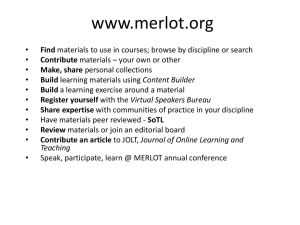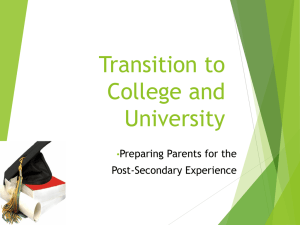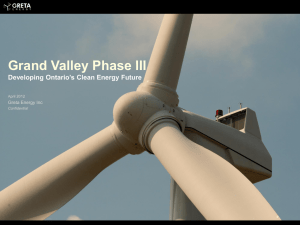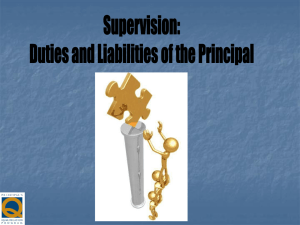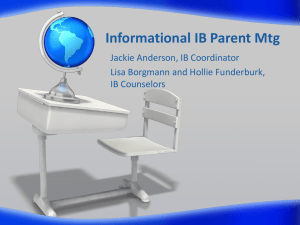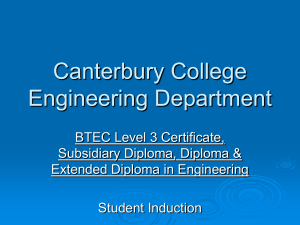Quality Assurance Frameworks
advertisement
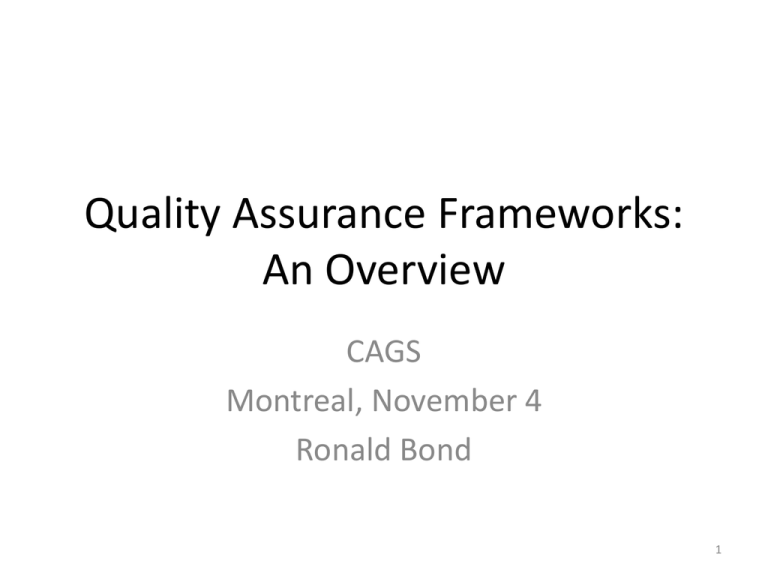
Quality Assurance Frameworks: An Overview CAGS Montreal, November 4 Ronald Bond 1 Frameworks • National Qualifications Frameworks • National and Transnational: EU • Regional/Provincial: Maritimes, Ontario, Alberta • Institutional: Guelph and Alberta 2 National • New Zealand: 10 levels • Australia: 360o • EU: national, but also European Qualifications Framework • US: Lumina Foundation • Canada 3 New Zealand Qualifications Framework 4 A Postcard from the Edge 5 6 • Canadian Degree Qualifications Framework • CMEC: 2007 • Elements • Differential use 7 Regional/Provincial • Maritimes: MPHEC – Maritime Degree Level Qualifications Framework • Ontario: PEQAB – Ontario Qualifications Framework • Ontario: COU QC – Quality Assurance Framework; Degree-level expectations • Alberta: CAQC – Organizational and Program Assessment Standards for Graduate Programs • BC: DQAB – Green Paper on a Quality Assurance Framework (2013) 8 Ontario Qualifications Framework ONTARIO QUALIFICATIONS FRAMEWORK A. Descriptors Overall Program Design and Outcome Emphasis 1 Certificate I 2 Certificate II Programs provide a level of skills, knowledge and attitudes to allow graduates to meet narrowly defined job requirements. Programs provide a level of skills, knowledge and attitudes to allow graduates to work in a limited range of activities within a prescribed range of functions. Certificate of 3 4 Apprenticeship Qualification Programs require the apprentice to demonstrate the skills and knowledge in a specific trade or occupation. Training is workplace-based. Requires the successful completion of on-the-job training standards of skills and safety as recommended by industry (80-90%) and formal instruction incorporating a blend of theory and practice (10-20%) Programs require the successful completion of the qualification/ certification examination for a trade or occupation. A holder is qualified to be employed in a specific trade or occupation. A holder of the Ontario Certificate of Qualification with a Red Seal is qualified to practice a specific trade or occupation in participating Canadian jurisdictions. QUALIFICATION DESCRIPTIONS The qualification categories distinguish between levels of knowledge based on a continuum ranging from the mastery of particular, established bodies of knowledge and skills to levels at the frontiers of knowledge where new knowledge is created and established assumptions and methods are challenged. Each qualification may be seen as a reference point along that continuum. The descriptions of each qualification outline its purpose, typical admission requirements and typical duration. The Ontario Qualifications Framework includes all non-religious postsecondary certificate, diploma and degree programs offered under the auspices of the Province of Ontario, including apprenticeship certificates, the qualifications awarded by private career colleges, the qualifications awarded by public colleges, and degrees offered by public universities and institutions authorized to award degrees by a consent of the Minister of Training, Colleges and Universities of Ontario. 5 Certificate III 6 Diploma I 7 Diploma II Programs provide a level of skills, knowledge and attitudes to allow graduates to perform in a defined range of varied activities within a prescribed range of functions involving known routines and procedures. Programs also engage students in some learning in disciplines outside their main field of study. Programs provide a level of skills, knowledge and attitudes to allow the graduates to work within a broad range of technical and/or administrative requirements, coordination and evaluation. Programs provide a level of skills, knowledge and attitudes to allow the graduates to work within a broad range of technical and/or administrative requirements, coordination and evaluation, and engage students in learning in disciplines outside their main field of study. 8 Advanced Diploma Programs provide the knowledge, skills and attitudes to enable graduates to work within a broad range of technical and/or management functions in a broad range of occupational areas. Graduates understand both the required conceptual frameworks as well as applications related to the specific occupational area. 9 Post-Diploma Certificate 10 11 Baccalaureate/Bachelor’s Baccalaureate/Bachelor’s Degree Degree: Honours Programs either deepen knowledge and skills already gained through a diploma or advanced diploma program or provide graduates of baccalaureate programs with specific knowledge and skills related to an applied occupational area. Programs provide some broad knowledge and conceptual sophistication, including specialized knowledge in at least one discipline or field. Learning outcomes and performance objectives are defined in provincial curriculum and training standards. 12 Masters Degree 13 Doctoral Degree Programs provide more conceptual sophistication, specialized knowledge and intellectual autonomy. Students learn appropriate applications of conceptual frameworks. Normally require students to prepare, under supervision, a terminal research paper, thesis, project, exhibition, etc. May also require to complete other practicebased exercises intended to develop and demonstrate the student’s readiness for employment. Types: –Academically-oriented –Profession-oriented –In an applied area of study For entry into graduate study in the field, secondentry professional degree programs or, depending upon content, employment in a particular field of practice or employment in a variety of fields. Programs require the student to develop and demonstrate advanced research skills under supervision. Some programs require students to demonstrate the necessary research, analytical, interpretative, methodological and expository skills in course exercises. Types: –Profession-oriented –Research-oriented Programs are thesisbased. Students must have demonstrated a high degree of intellectual autonomy, an ability to conceptualize, design and implement projects for the generation of significant new knowledge and/or understanding, and their ability to create and interpret knowledge that extends the forefront of a discipline, usually through original research or creative activity. Types: –Profession-oriented –Research-oriented For either further study in the discipline or for employment in circumstances requiring sound judgment, personal responsibility and initiative, in complex and unpredictable professional environments. For employment requiring the ability to make informed judgements on complex issues in specialist fields, and innovation in tackling and solving problems. Preparation for Employment and Further Study For employment at entry-level positions or to prepare graduates to begin postsecondary studies. To provide workplacebased training in skilled trades or occupations. To ensure individual’s preparedness to be employed in specific skilled trade or occupation. For employment at entrylevel positions and for further postsecondary studies. For employment at entrylevel positions and for further postsecondary studies. For employment at entry-level positions and for more specialized education at an advanced level. For employment in a more specialized role and for further postsecondary studies. For some second-entry professional degree programs, employment in a variety of fields, or advanced entry into an honours or specialist program of study in the field. Typical Duration At least 40 instructional hours. 240 to 500 instructional hours. Up to five years depending on the trade or occupation. N/A Two semesters or 600700 equivalent instructional hours. 1000+ instructional hours. Four semesters or 12001400 equivalent instructional hours. Two semesters or 600700 equivalent instructional hours. Six to eight semesters in duration (normally 90 to 120 credits, or the equivalent). Eight semesters or more. Normally 120 credits or the equivalent). May be supplemented by required professional experience (e.g., supervised practica, internships, work terms, co-ops). Three to five semesters. Normally 45-60 credits or the equivalent. Three to five years in length, depending on the field and the speed at which individuals progress through requirements. Admission Secondary school diploma or equivalent; or at least 18 years old (PCC) or at least 19 years old (CAAT); or is the holder of an admission requirement established by the Board of Governors (CAAT) or Superintendent of Private Career Colleges (PCC) for a specific program of instruction and additional program-specific requirements. Academic entry requirements are defined in regulation. May be up to grade 12 but varies depending on the trade or occupation. Other entry requirements may be determined depending on the trade or occupation. Minimum age: 16 years. Demonstration of equivalent experience in a trade or occupation including meeting the performance objectives as defined in the training standard recommended by industry. Secondary school diploma or equivalent; or at least 18 years old (PCC) or at least 19 years old (CAAT); or is the holder of an admission requirement established by the Board of Governors (CAAT) or Superintendent of Private Career Colleges (PCC) for a specific program of instruction and additional program-specific requirements. Ontario College Diploma, Ontario College Advanced Diploma, private career college diploma, degree or equivalent and additional programspecific requirements. Ontario Secondary School Diploma or equivalent, six university or university/college courses at the Grade 12 level, a minimum average set by the institution and additional requirements as programs require. Ontario Secondary School Diploma or equivalent, six university or university/college courses at the Grade 12 level, a minimum average set by the institution and additional requirements as programs require. Baccalaureate/Bachelor’s Degree: Honours or other undergraduate degree, plus bridging studies where necessary. Normally a Masters degree, though some doctoral programs admit high-performing students with Baccalaureate/Bachelor’s Degree: Honours degrees. In some cases, bridging studies may be required. Requirements Six semesters or 18002100 equivalent instructional hours. Also CAAT admission requirements for Co-op Diploma programs. Provider* Private Career College (PCC) PCC College of Applied Arts and Technology (CAAT) Training provided by ministry-approved training delivery agents (majority are CAATs) and employers. The ministry issues the certificate. Service provided by ministry Employment Ontario examination centres. The ministry issues the certificate. CAAT PCC CAAT PCC/CAAT PCC/CAAT Ontario public university/consent holder pursuant to Post-secondary Education Choice and Excellence Act, 2000. Qualification Awarded PCC: TBD PCC: TBD CAAT: Certificate Ontario Certificate of Apprenticeship Ontario Certificate of Qualification CAAT: Ontario College Certificate PCC: TBD CAAT: Ontario College Diploma PCC: TBD CAAT: Ontario College Advanced Diploma PCC: TBD CAAT: Ontario College Graduate Certificate Baccalaureate/Bachelor’s Degree Baccalaureate/Bachelor’s Degree: Honours Masters Degree Doctoral Degree *The Ontario Qualifications Framework will be phased in over a period of time in the private career college sector. 9 Ontario Qualifications Framework ONTARIO QUALIFICATIONS FRAMEWORK B. QUALIFICATION STANDARDS This table outlines the generic competencies that the holder of each qualification is expected to be able to demonstrate, with a focus on knowledge and skills transferable to the workplace or useful for further study. The descriptors in the first column indicate the different categories of competencies, which vary in nature and degree depending on the qualification. The capacity to work creatively and autonomously is required at all levels but in contexts that range from fixed routines to those characterized by ambiguity and uncertainty. Descriptor 1 Certificate I 2 Certificate II Certificate of 3 Apprenticeship 4 Qualification The skill and knowledge requirements for successful performance in a trade or occupation as defined in provincial or national training/occupational standards. Depth and Breadth of Knowledge The basic skill and knowledge requirements for entry-level employment in positions with clearly defined requirements. The basic skill and knowledge requirements for entry-level employment in positions with a limited range of activities within a prescribed range of functions. The skill and knowledge requirements for successful performance in a trade or occupation as defined in provincial training standards. Conceptual & Methodological Awareness/ Research and Scholarship A prescribed range of functions involving known routines and procedures. a) A prescribed range of functions involving known routines and procedures; b) Understanding and application of mathematical concepts and reasoning; analyzing and using numerical data; and conceptualizing; c) Application of a variety of thinking skills and a systematic approach to anticipate and solve problems; d) Ability to analyze, evaluate, and apply relevant information from a variety of sources. a) Performance of defined competencies with associated knowledge is usually within a range of broader related activities involving known routines, methods and procedures, and analyzing and evaluating situations to determine a course of action; b) Knowledge of the main methods of enquiry in their field that enable the individual to: i. Evaluate the appropriateness of different approaches and techniques to solving problems using known routines, methods and procedures of the trade or occupation; ii. Solve practice-related problems using ideas and techniques common to the trade or occupation; iii. Conceptualize and implement innovative approaches to situations; iv. Select, adapt and transfer skills and knowledge to varying occupational settings. *The Ontario Qualifications Framework will be phased in over a period of time in the private career college sector. 5 Certificate III 6 Diploma I 7 Diploma II 8 Advanced Diploma 9 Post-Diploma Certificate 10 Baccalaureate/Bachelor’s Degree 11 Baccalaureate/Bachelor’s Degree: Honours 12 Masters Degree 13 Doctoral Degree a) A developed knowledge and critical understanding of the key concepts, methodologies, current advances, theoretical approaches and assumptions in a discipline overall, as well as in a specialized area of a discipline; b) A developed understanding of many of the major fields in a discipline, including, where appropriate, from an interdisciplinary perspective, and how the fields may intersect with fields in related disciplines; c) A developed ability to: i. gather, review, evaluate and interpret information; ii. compare the merits of alternate hypotheses or creative options, relevant to one or more of the major fields in a discipline; d) A developed, detailed knowledge of and experience in research in an area of the discipline; e) Developed critical thinking and analytical skills inside and outside the discipline; f) The ability to apply learning from one or more areas outside the discipline. An understanding of methods of enquiry or creative activity, or both, in their primary area of study that enables the student to: a) Evaluate the appropriateness of different approaches to solving problems using well established ideas and techniques; b) Devise and sustain arguments or solve problems using these methods; c) Describe and comment upon particular aspects of current research or equivalent advanced scholarship. A systematic understanding of knowledge, including, where appropriate, relevant knowledge outside the field and/or discipline, and a critical awareness of current problems and/or new insights, much of which is at, or informed by, the forefront of their academic discipline, field of study or area of professional practice. A thorough understanding of a substantial body of knowledge that is at the forefront of their academic discipline or area of professional practice, including, where appropriate, relevant knowledge outside the field and/or discipline. a) A conceptual understanding and methodological competence that: i. Enables a working comprehension of how established techniques of research and inquiry are used to create and interpret knowledge in the discipline; ii. Enables a critical evaluation of current research and advanced research and scholarship in the discipline or area of professional competence; iii. Enables a treatment of complex issues and judgements based on established principles and techniques; b) On the basis of that competence, has shown at least one of the following: i. The development and a) The ability to conceptualize, design and implement research for the generation of new knowledge, applications or understanding at the forefront of the discipline, and to adjust the research design or methodology in the light of unforeseen problems; b) The ability to make informed judgements on complex issues in specialist fields, sometimes requiring new methods; c) The ability to produce original research or other advanced scholarship of a quality to satisfy peer review and to merit publication. a) The basic skill and knowledge requirements for entry-level employment in positions with limited range of activities within a prescribed range of functions; b) Some breadth beyond the vocational field within the themes of: arts in society; civic life; social and cultural understanding; personal understanding; and science and technology. The skill and knowledge requirements for successful performance in a complex occupational setting. a) The skill and knowledge requirements for successful performance in a complex occupational setting; b) At least some breadth beyond the vocational field, with exposure to at least one discipline outside the main field of study within the themes of: arts in society; civic life; social and cultural under-standing; personal understanding; and science and technology, to increase awareness of the society and culture in which they live and work. a) The skill and knowledge requirements for successful performance of a specialized range of activities, most of which would be complex or non-routine in an occupational setting; b) At least some breadth beyond the vocational field, with exposure to at least one discipline outside the main field of study within the themes of: arts in society; civic life; social and cultural understanding; personal understanding; and science and technology, to increase awareness of the society and culture in which they live and work. a) Specialized knowledge in a specific field; b) A level of knowledge and skill that enhances one's ability to perform a more specialized range of complex and nonroutine activities within the field; c) Locally determined exposure to disciplines outside the main field of study. a) A general knowledge and understanding of many key concepts, methodologies, theoretical approaches and assumptions in a discipline; b) A broad understanding of some of the major fields in a discipline, including, where appropriate, from an interdisciplinary perspective, and how the fields may intersect with fields in related disciplines; c) An ability to gather, review, evaluate and interpret information relevant to one or more of the major fields in a discipline; d) Some detailed knowledge in an area of the discipline; e) Critical thinking and analytical skills inside and outside the discipline; f) The ability to apply learning from one or more areas. a) A prescribed range of functions involving known routines and procedures; b) Understanding and application of mathematical concepts and reasoning; analyzing and using numerical data; and conceptualizing; c) Application of a variety of thinking skills and a systematic approach to anticipate and solve problems; d) Ability to analyze, evaluate and apply relevant information from a variety of sources. a) A range of skills, with associated knowledge, showing substantial depth in some areas where judgment is required in the planning and selection of appropriate equipment, services, or techniques for self and others; b) Understanding and application of mathematical concepts and reasoning; analyzing and using numerical data; and conceptualizing; c) Application of a variety of thinking skills and a systematic approach to anticipate and solve problems; d) Ability to analyze, evaluate and apply relevant information from a variety of sources. a) A significant range of skills associated with fundamental principles and complex techniques across a wide and often unpredictable variety of contexts in relation to either varied or highly specific functions; b) Understanding and application of mathematical concepts and reasoning; analyzing and using numerical data; and conceptualizing; c) Application of a variety of thinking skills and a systematic approach to anticipate and solve problems; d) Ability to analyze, evaluate and apply relevant information from a variety of sources. A prescribed range of skilled operations that includes the requirement to evaluate and analyze current practices, develop new criteria, and may include the provision of some leadership and guidance to others in the application and planning of skills. An understanding of methods of enquiry or creative activity, or both, in their primary area of study that enables the student to: a) Evaluate the appropriateness of different approaches to solving problems using well established ideas and techniques; b) Devise and sustain arguments or solve problems using these methods. 2 10 Institutional • University of Guelph – University of Guelph 2013 Learning Outcomes: Graduate Degree • University of Alberta – A Quality Assurance Framework for Graduate Education (2013) 11 Questions and Issues • How useful are generic standards? • What degree of differentiation is desirable? • Should there be a separate framework or rubric for programs delivered on-line? • Are graduate-level assessment strategies designed with learning outcomes in mind? 12
